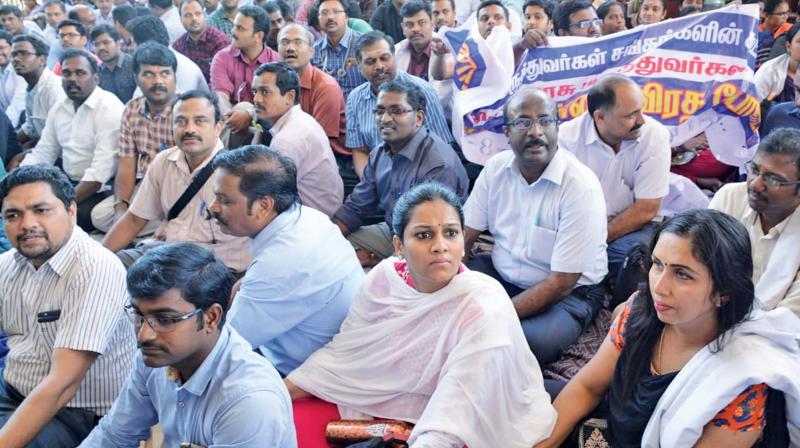Doctors withdraw strike: Tamil Nadu Government to resolve issues in 6 weeks
Health min, officials talk to protesting doctors.

CHENNAI: The statewide one-day token strike staged by government doctors across Tamil Nadu seems to have had the desired impact, with the government as well several major political parties in the state finally taking cognizance of the issue at hand. The state health minister along with members from DMS, DME and DPH held talks with 31 doctors from various state government doctors' association at the secretariat on Tuesday. The talks came to an amicable end with the government promising to resolve the issue within six weeks and the doctors subsequently announcing their decision to withdraw their strike.
Dr Senthil Raj, Director, Tamilnadu AIDS Control Society, has been appointed to review the doctors' demands and has been directed to inform the government of the developments once in two weeks. Health minister Dr. C.Vijayabasker has also announced that a favourable decision would soon be taken after holding discussions with the Chief minister.
Around 600 doctors assembled at Madras Medical College on Tuesday demanding implementation of their long-standing four-point charter of demands.
As a result of the strike, both outpatient and inpatient services as well surgeries were suspended in all government hospitals. However, doctors have said that emergency, causality and ICU services were attended to.
Six doctors, including three female doctors, have also been on an indefinite fast at MMC from August 23. Four out of these six doctors are currently being treated in the ICU of Rajiv Gandhi Government Medical College and Hospital, according to reports.
The government doctors in the state have been protesting for almost a year now demanding implementation of their four-point charter of demands. These demands include implementation of Dynamic Assured Career Progression(DACP) under Government Order 354 which would ensure pay hike for the doctors after 4, 9 and 13 years of service, upscaling of the number of doctors in government hospitals, 50 per cent seat allocation for service quota candidates and counselling for posting and relocation of service postgraduates.
Question and Answer (With Dr.Ravindranath, General Secretary, Doctor's Association for Social Equity)
Q: Why has Dynamic Assured Career Progression(DACP) not been implemented in Tamil Nadu, a high-ranking state in the NITI Aayog health index when low-performing states like Bihar have the provision?
A: The government's attitude towards doctors can be solely blamed for this. As a state which boasts of advanced medical technologies and health services, the contribution of hardworking government doctors who have been instrumental in attaining this status should not be overlooked. I see no reason for the government to deny our requests. The salaries of court officials were increased recently. When the government had no problem with that, they shouldn't have an issue with our case too. But the truth is government is now planning to run the state health sector with 'temporary ' and 'contract-based' professionals, with low wages. They want to employ 5 temporary doctors in the place of one government doctor. Several international organizations such as the World Bank are involved in this.
Q: The government has repeatedly cited the lack of funds as the reason for the failed implementation of DACP. Is the government in TN, a 'so-called' economically sound state with a significant amount allocated for health budget adopting a dubious stand on this issue?
A: It is unacceptable if the government blames the fund crisis for non-implementation of DACP. The demand for doctors would cost the government just 150 crores of the health budget. These officials had earlier said that 80 per cent of the state's budget is spent on government servants. I see this as a gimmick by the government to create tensions between the public and the medical community. In truth, only 39 per cent of the state's budget is spent on government employees, in total. If the economy was to be blamed, the mismanagement of revenue is the only plausible explanation they can offer.
Q: Thousands of patients are being affected by doctors' protest. Do you think it is ethical for doctors to strike?
A: Doctors, as individuals, have rights to protest. Having said this, they should also be aware as to when and where to exercise these rights. When we protest we cannot shut down a hospital completely, keeping in mind the patients' welfare. Even today's strike has a success rate of 90 per cent cause the remaining doctors are still attending to the people. Moreover, we announced our plans to go on a statewide token strike, well in advance -almost two months back. The government did not respond to this or to any of other agitations in the past one year. They are totally aware of the implications a doctors' strike could have on the public. Their apathy despite knowing this only shows how much they care about the public.
Q: As doctors, is 'fast-undo-death' way of death acceptable?
A: It is true that indefinite fasting can result in severe complications like cardiac arrest, renal problems, brain malfunctions and multiple organ failure. But we have been pushed into this. It is rather sad that the government did not respond to our demands, despite staging a hunger strike for six consecutive days.

